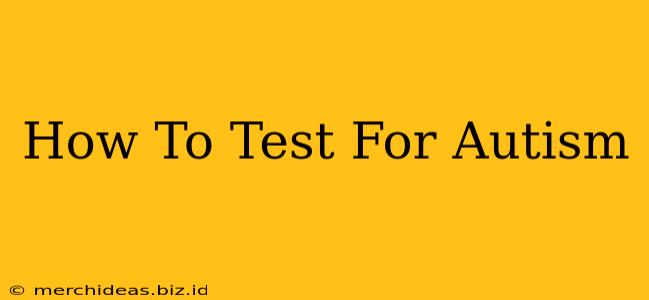Autism Spectrum Disorder (ASD) is a complex neurodevelopmental condition affecting social interaction, communication, and behavior. Early diagnosis is crucial for accessing appropriate interventions and support. While there's no single definitive test for autism, a thorough assessment involves several steps. This guide outlines the process, highlighting key elements for parents and professionals alike.
Understanding the Diagnostic Process for Autism
Diagnosing autism isn't a simple process; it requires a multi-faceted approach. It's not a blood test or a single scan; instead, it involves a comprehensive evaluation performed by qualified professionals, often a team including psychologists, psychiatrists, and developmental pediatricians.
Key Components of an Autism Evaluation:
- Developmental History: This crucial step involves gathering detailed information about the child's development from birth, focusing on milestones like speaking, playing, and social interaction. Parents play a vital role in providing this information.
- Behavioral Observations: Professionals directly observe the child's behavior in various settings, noting their interactions with others, communication styles, and play patterns. This often involves structured and unstructured observations.
- Standardized Assessments: Several standardized tests are used to assess different aspects of development. These tools measure cognitive abilities, language skills, adaptive behavior, and social skills. Common examples include the Autism Diagnostic Observation Schedule (ADOS) and the Autism Diagnostic Interview-Revised (ADI-R). These are administered by trained professionals.
- Medical Evaluation: This may rule out other conditions with overlapping symptoms. It might include a physical exam and possibly additional tests depending on the individual circumstances.
What to Expect During the Autism Evaluation Process
The entire process can take several weeks or even months, depending on the availability of specialists and the complexity of the case. It is important to be patient and to communicate openly with the professionals involved.
Questions to Ask Your Doctor or Specialist:
- What are the specific tests you will be using? Understanding the methodology will help you understand the process better.
- What kind of qualifications do you have to diagnose ASD? Ensure your child's assessment is performed by experienced and qualified professionals.
- What are the next steps if my child receives a diagnosis? Discuss available resources and support services immediately.
- What are the potential challenges and benefits associated with an early diagnosis? Early intervention can lead to significant positive outcomes.
Early Signs and Symptoms of Autism
Recognizing potential signs early is crucial. While a professional diagnosis is necessary, parents should be aware of possible indicators. Remember that displaying some of these symptoms doesn't automatically mean a child has autism.
Common Early Warning Signs:
- Delayed language development: Limited or absent babbling, late speaking, or difficulty understanding language.
- Repetitive behaviors: Engaging in repetitive movements, such as hand flapping or rocking.
- Limited social interaction: Showing little interest in interacting with others, avoiding eye contact, or having difficulty understanding social cues.
- Sensory sensitivities: Unusual responses to sensory input, such as sounds, lights, textures, or tastes.
- Unusual play patterns: Playing with toys in unusual ways, such as lining them up in a row or only focusing on one aspect of a toy.
Note: This list is not exhaustive, and the manifestation of autism varies greatly between individuals.
Seeking Help and Support
If you have concerns about your child's development, don't hesitate to seek professional help. Early intervention is key to improving outcomes. Your pediatrician is a good starting point, and they can refer you to specialists experienced in diagnosing and treating ASD.
Resources for Parents:
Several organizations provide invaluable information, support, and resources for families affected by autism. These organizations offer educational materials, support groups, and advocacy services. Research your local resources for the best options in your area.
This guide provides a general overview. The specifics of testing for autism may vary depending on the individual and the healthcare system. Always consult with qualified professionals for personalized guidance and diagnosis.
